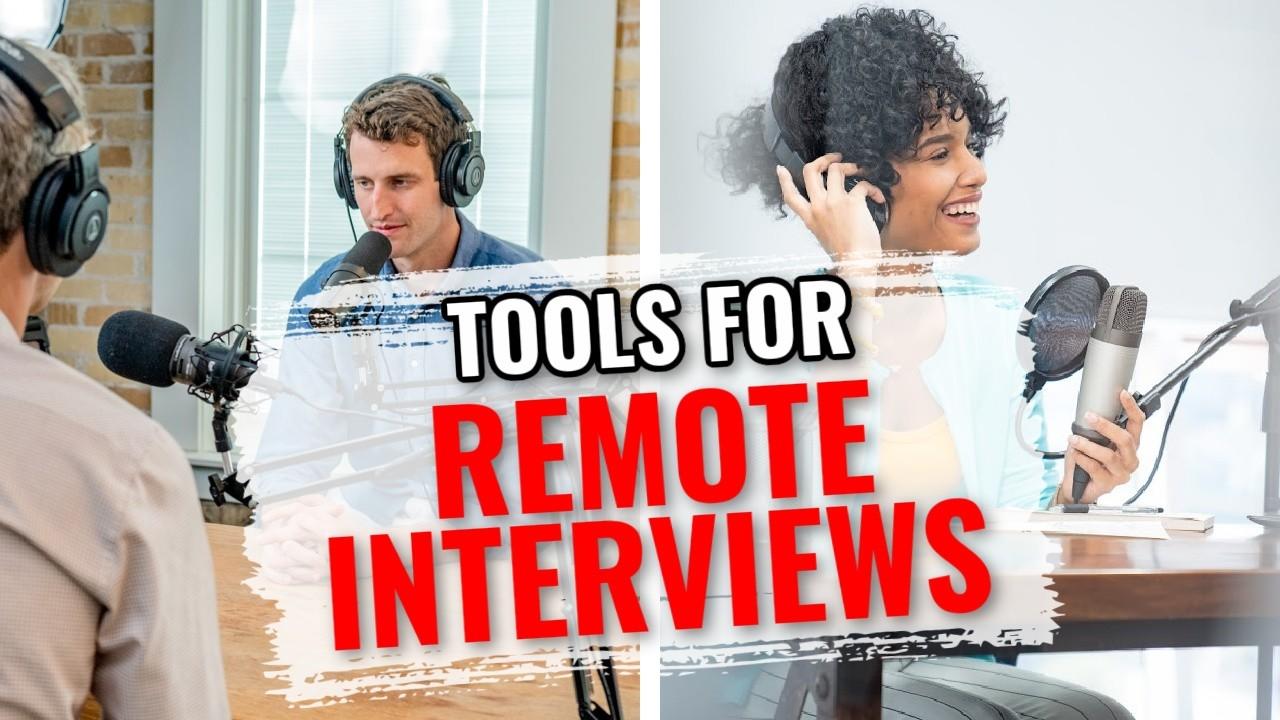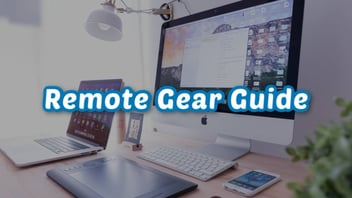
When it comes to podcasting, some of the best shows on the planet are interview style. Interacting with a subject matter expert or insightful guest can help listeners and easily become slam-dunk content. Despite being over 29 million podcast episodes in existence, the best always seem to be an interview. That’s because an interview connects us with someone who we would have never been able to reach before. If you have a podcast and you’re looking to interview someone, or you’re starting up your very own show, you’re going to need podcast tools to help you crush your interview.
Remote interviewing will be crucial today.
Podcast interviews are conducted in two ways. In-person interviews are often the most preferred as they bring an added dimension to hear the guest and interviewer interact. They also sound better since the podcaster has some control over the sound quality.
The other option is a remote interview.
Remote interviews are convenient as they can save time and get you to access an A-lister who cannot reach you. Remote interviews also help with getting more than one guest at a time for the same episode. However, remote interviews have a few technical hiccups that can ruin a good thing. For example, Skype or Google Hangout is a popular choice for conducting interviews, but the sound quality (and video quality) is often poor, even with a great internet connection.
So it’s important to get the right tools to conduct an effective interview. It’s even more important with our new normal. The 2020 pandemic shifted the focus to remote work and remote business. So unless you have the resources of Joe Rogan to keep your interview podcast going, you’ll be mainly operating remotely. Here are some amazing tools to help you record your podcast remotely.
Record with Zencastr
Zencastr promises to be “the easiest way to record your VoIP podcast interviews in studio quality.” The application seeks to take away the stress that comes with VoIP audio or trying to coach your guest to record their own audio. Once you set up an account and log into the browser, all you need to do is send your guest an invite link. Everything is recorded through the browser. Zencastr will record a separate audio file for each guest. You can also edit in real-time on the dashboard. Zencastr can then produce a single mixed track that’s ready to go live.
You can try Zencastr for free for up to 8 hours a month with high-quality MP3 audio. At $20 a month, you get unlimited audio and guests with recording in 16-bit 44.1k WAV and 10 Hours automatic postproduction.
Ringr: An Audio Recording App With Phone Capabilities.
Now that recording and interviewing remotely is necessary, Ringr may be just what the doctor ordered. Their $18.99/month premium plan gives you studio-quality sound and multiple audio formats. You also get unlimited storage, calls, and split-track options. All you need to do is send an invite, which your guest receives via email. Ringr has apps for IOS, Android, and desktop, so your guest could start the audio recording on any device they choose. With Ringr, you get superior audio quality at a competitive price.
Consider SoundTrap
Spotify wants to make podcasting as simple and smooth as possible. So they made some changes to their software SoundTrap. SoundTrap has been a go-to for artists to record, edit, and modify your music so you can publish directly to the app. It’s SoundTrap for Storytellers extension allows you to record, edit, and master your audio in one place. Like Zencasty, SoundTrap works great for remote interviews. Send your guest a link, and they can tune in and start the interview right away. SoundTrap even includes video so that you can publish your content on YouTube.
At $14.99 per month, this is a great tool to give you exceptional audio in your remote interviews. However, the app can only have one guest at a time. You also cannot adjust or monitor audio levels in real-time. But it’s great for audio quality, ease of use, and other built-in tools like transcriptions.
Seamless Recording With Squadcast
Squadcast allows you to produce studio-quality audio remotely quickly. It’s becoming a go-to for many podcasters for its ease and cloud capabilities. Squadcast records local audio, which it uploads on its cloud in real-time, which can be a godsend if there are connection issues. Up to 3 guests and 1 host can record on one session, and there are video capabilities too.
Record in MP3 or 16-bit 44.1k WAV and integrate your audio editing tools for seamless post-production. You get a free 7-day trial with their Dabbler, Creator, and Pro plans, which start as low as $10/month.
If All Else Fails, Stick With Zoom.
While I discourage you from using Skype or Google Hangouts, if you really have no choice but to use a Cloud service, stick with Zoom. Zoom gives you the option to record the audio separately and has slightly better audio and video than Skype. You will need a paid plan if you’re planning on conducting several hours of interviews per month. However, you can have connection issues similar to Skype and Google.
Don’t drop the interview ball again.
Investing in a quality program for remote interviews can save you time and stress. It’s a pain when you have poor audio through no fault of your own. That’s why any of these apps can help. Remote podcasting will now become commonplace, even when things get a little more under control. Zencastr and Ringr are great options. However, if you’re considering integrating and publishing a video, Squadcast seems like the go-to choice.
Podcasting can be a challenge. You need to have audio, content, and growth, all working seamlessly. I would know, having created and managed my Brutally Honest podcast. If you need help in any of these areas, feel free to sign up for my email list. I share more blogs, content, tips, and tricks to make your podcast shine.





